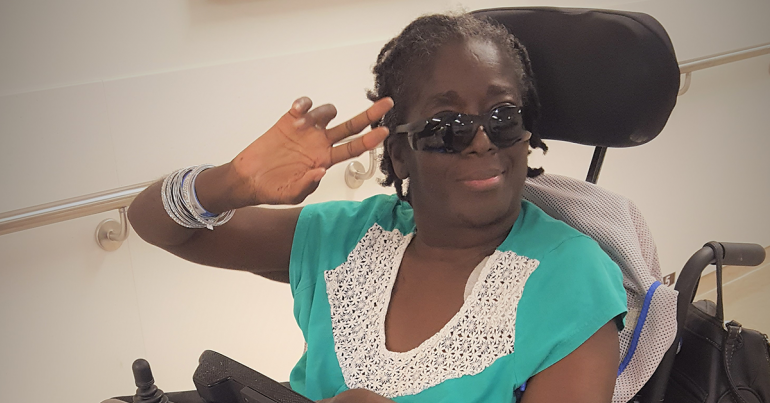 Nell Toussaint lived a life of courage, determination and inspiration. She fought to ensure everyone can access health care in Canada, regardless of their immigration status. CUPE is remembering Nell and uplifting her struggle by honouring her for Black History Month 2024.
Nell Toussaint lived a life of courage, determination and inspiration. She fought to ensure everyone can access health care in Canada, regardless of their immigration status. CUPE is remembering Nell and uplifting her struggle by honouring her for Black History Month 2024.
Born in 1969 in Grenada, Nell was the second of 10 children. She moved to Trinidad when she was five, where she grew up. Like many kids, Nell dreamed of a life in the skies and wanted to be a flight attendant.
When she moved to Canada in her twenties, she lived in Montreal and then Toronto. Nell experienced discrimination and had to survive some tough times. She recalled remembering the sun of Trinidad as she slept in her car using blankets and pillows for warmth.
Like many CUPE members, Nell worked as a caregiver for children, cleaned homes and did domestic work, and also worked in factories.
Denied access to health care
When Nell got sick, she did not know it would start a journey to the United Nations. Nell was denied access to public health care because she did not have the right kind of immigration status.
Immigration status is complicated, as CUPE members who have experienced the immigration system know. People may arrive as a visitor, a student, a refugee claimant or a temporary foreign worker, among others. Like Nell, they may run into trouble converting their immigration status into a different one, rendering them “irregular” migrants. In Canada, irregular migrants may be denied access to health care – even if their life is at risk. This is what happened to Nell.
As Nell’s condition worsened with life-threatening complications from diabetes, she could not pay for health care. Her immigration consultant helped her apply for federal health care coverage through a program designed for migrants, such as refugee claimants, who are in precarious situations.
Fighting for human rights
Nell was denied coverage because of her irregular immigration status. Even though she was at risk of being deported, Nell decided to challenge this in Canadian courts as a violation of human rights.
Although she was unsuccessful in the courts, Nell eventually got permanent residency on humanitarian and compassionate grounds and received health care coverage. Nevertheless, she refused to accept that others would be subjected to what had happened to her.
She took her case to the United Nations, where her team argued that Canada had violated binding human rights obligations.
In a historic decision welcomed internationally by migrant workers and human rights advocates, the UN Human Rights Committee upheld Nell’s claim. The committee found that Canada had violated Nell’s right to life and discriminated against her by denying her access to health care, a decision that put her life at risk and caused irreversible harm. The committee called on Canada to ensure access to essential health care regardless of immigration status.
Canada refuses to provide health care for all
When the Canadian government refused to recognize the UN committee’s decision, Nell went back to court. She had another big win when the Ontario Superior Court rejected Canada’s attempt to have her case dismissed. The court found that Canada’s response to Nell’s claim reeked of prejudicial stereotypes about migrants. The judge ruled her challenge should proceed.
Sadly, Nell passed away on January 9, 2023, shortly after the court released its decision. But Nell’s mother Ann, supported by a broad range of human rights, health care and migrant workers’ organizations, is continuing the legal fight.
Black History Month is not just about remembering history – it is about learning from it.
CUPE joins Nell’s family and many others in calling on the Canadian government to ensure health care for all, regardless of immigration status.


